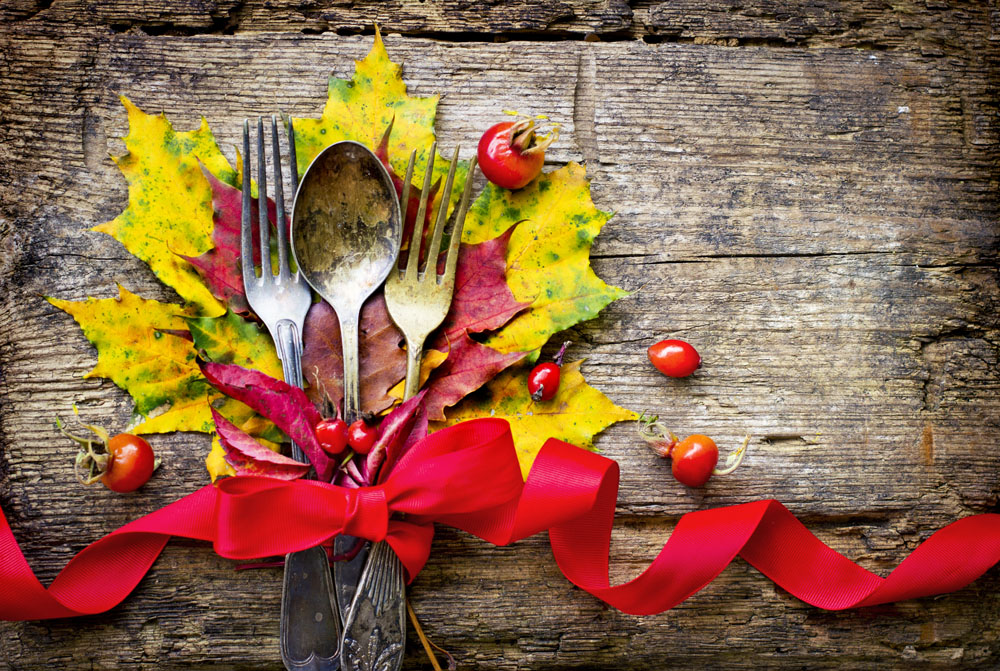
In the United States, the Thanksgiving holiday (the last Thursday of November) marks the beginning of six weeks holiday festivities, family feasts and seasonal treats. The ancient Indian health science of Ayurveda offers helpful tips on how to navigate the holiday season without gaining weight or over-eating.
Winter cravings
The increasingly colder days of fall bring with them an increase in Vata dosha — the subtle energy in the body that governs movement. When Vata dosha predominates, there is an increase in dry, rough and cool qualities in the body. This dryness can disturb various tissues and organs.
Many people notice dry skin and lips during the winter months. Dryness can also occur in the colon or large intestine, leading to constipation. Simultaneously you may find that you develop cravings for heavy, sweet and unctuous foods. This is simply your body’s attempt to balance the increase in Vata by increasing Kapha. Unfortunately, these heavier foods can also lead to poor digestion and to an accumulation of toxins over the winter, which could lead to allergies and colds in the spring.
Holiday Eating Tips
The following tips can help you navigate the holiday festivities, pacifying Vata dosha while avoiding the weight-gain often brought on by Kapha-increasing foods.
- At the start of the holiday season, consult an Ayurvedic expert to see if you have any nutritional deficiencies or imbalances. If these are left untended, you may find yourself at the mercy of cravings and compulsive eating.
- When you first arrive at a gathering, request a cup of hot water. This will help to pacify Vata and also help you avoid mindless eating. In addition, people often mistake thirst for hunger. If you are well hydrated, you will feel less compulsion to eat. Drinking plain hot water throughout the day is a simple Ayurvedic secret for improved health.
- Always sit down at a table to eat. Don’t eat if you are standing or moving.
- Whenever you eat, give eating your full attention. Enjoy your food — even if you are eating something “naughty”. Eating mindlessly does not allow you to properly taste, experience, or digest your food. As a result, even if you are full, you will feel unsatisfied and want to eat more later. Don’t multli-task at meal times.
- Learn about the six tastes: sweet, sour, salty, pungent, bitter and astringent. Each taste satisfies a different need. Missing one or more of the tastes can result in cravings. Try to have all six tastes at each meal. If this sounds daunting, there are spice combinations (churnas) made specifically for this.
- Favor warm, cooked foods.
- If you want to indulge in heavier foods, do so at mid-day, when your digestive “fire” is stronger. Try to keep evening meals light, favoring soups and cooked vegetables.
- Try to take small portions. Ideally you should feel refreshed and energized after eating, not dull. Over-eating compromises digestion. When you overeat, even though you ingest more than you need, your body actually assimilates less. This can result in nutritional deficiencies, perpetuating cravings and the habit of overeating.
Eating with full attention and enjoyment improves digestion. It settles and strengthens your entire system. This can have far-reaching health benefits seemingly unrelated to nutrition.
If you find that you have over-indulged during the holidays, consider enjoying the traditional Ayurvedic purification treatments, called Panchakarma, in January or February. The soothing oils used in the treatments help purify body fat and the recommended diet before, during and after treatment is the perfect way to get back into healthy eating habits. Scheduling Panchakarma treatments in January can reset your physiology for the rest of the year and help eliminate the effects of holiday indulgences.
